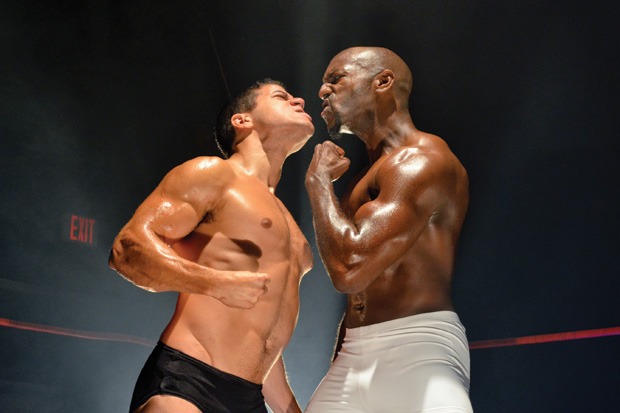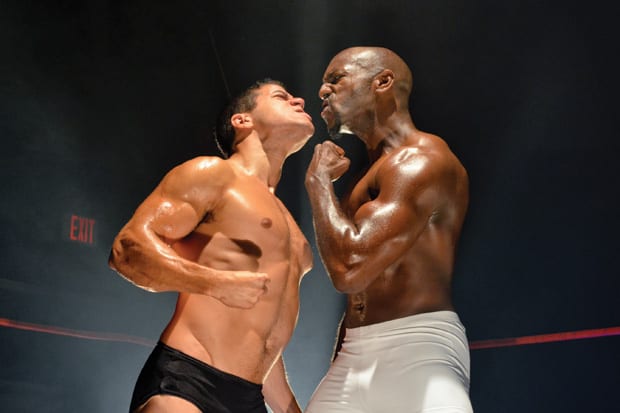Pop culture’s most homoerotic ‘sport’ proving a boon to ‘Chad Deity’ star

BODY SLAMMED | Corey Jones, right (pictured with Alex Hernandez), sculpted his body to play a
flamboyant pro wrestler in DTC’s ‘The Elaborate Entrance of Chad Deity.’ (Photo courtesy Karen Almond)
ARNOLD WAYNE JONES | Life+Style Editor
The first time Corey Jones saw the costume he was expected to wear playing a pro wrestler in The Elaborate Entrance of Chad Deity, his reaction was simple: Hell, no.
 “It was basically a thong,” he says over a bowl of queso fundito. “I don’t care what your sexual orientation is, it is no fun having a piece of fabric in your crack.”
“It was basically a thong,” he says over a bowl of queso fundito. “I don’t care what your sexual orientation is, it is no fun having a piece of fabric in your crack.”
Jones couldn’t have been too surprised. Pro wrestling is, after all, the gayest of all sports, unless you count men’s ice figure skating — and ironically so. Its heroes wear tights, worship their own well-toned muscles and roll around with other half-naked men. They must be the such only figures that a macho dad would happily dress his 6-year-old son as. But Jones still wasn’t having the thong.
They settled on a more comfortable, if not more modest, pair of white briefs, but for Jones, the goal was still the same: Get in shape.
At 6-foot-2 and a lean 190 pounds, Jones is hardly what you’d call out of shape. But the actor — who lives in Los Angeles but proudly touts his Texas roots from attending grad school at UT-Austin — was never, he admits, an athlete.
“I didn’t play sports in high school or college; I was always the skinny guy,” he says. But tackling the title role in Chad Deity has required him to bulk up. It’s why he doesn’t mind diving into a bowl of queso — hey, a wrestler needs his protein.
“This summer when I got the role, I started hitting the gym four or five times a week,” Jones says. That increased exponentially once rehearsals started. “It’s been six days a week, and I’m focused on gaining mass,” he says. “My goal is 210 pounds by opening night. We’ll see…”
The experience working on the play — which premiered in Jones’ hometown of Chicago and deals with issues of race, hip-hop and the culture of excess — has not only changed Jones’ body, but also his perception of professional wrestling.
“When [a friend] first suggested I audition for it, I said, ‘Isn’t that a play about wrestling? You think I’d be right for it?’”
Jones had his suspicions. Like a lot of people, he’d always assumed the “sport” was just a big put-on: Showman pretending to wrestle who adhered to a prepared script.
“I thought, ‘He’s not really hitting that guy!’ It insults your intelligence. But you know what? The skill and athleticism it takes to pretend to do a pile-driver is just as demanding as something like football. It’s really where art and sports meet, with all this choreography.”
As an actor, choreography is something Jones is familiar with, but he has tremendous respect for one of his co-stars, Jaime Olivencia, who plays many of the ring opponents and is in fact a pro wrestler by training. (“Man, he came in chiseled,” Jones says. “And Alex Hernandez, who plays Mace, whose story this really is, is an outdoorsy guy, too.”)
Getting to play Chad Deity — a fictional creation who has the fame and grandeur of a John Cena or Hulk Hogan — also gave Jones insights into pop culture he hadn’t really considered before.
“This play is about class and the haves and have-nots and the glorification of celebrity and excess, especially as it is propagated by hip-hop,” he says. “There’s this image that if you don’t have the ability to make it rain and 45 women hanging on you, you are not valued.”
It’s something that irritates Jones, a thoughtful and well-read man who is just as happy talking about Obama advisers Plouffe and Axelrod as he is Game of Thrones. He created his own backstory for Chad Deity that includes a childhood of poverty, but also a sense that the man has become the image — that even if private, he’s never just “Darnell,” he’s a superstar who deserves all he got, a modern day Charles Foster Kane in his castle, removed from the realities of the world. It’s a sad role, really.
But there is one thing that makes him happy about Chad: Corey Jones could never have afforded the time and expense to pay quality trainers that Chad has, and that he’s worked with on this show.
“After all this hard work, we’ll all leave here with great bodies,” he says.
There’s always a bright side.
This article appeared in the Dallas Voice print edition October 26, 2012.


